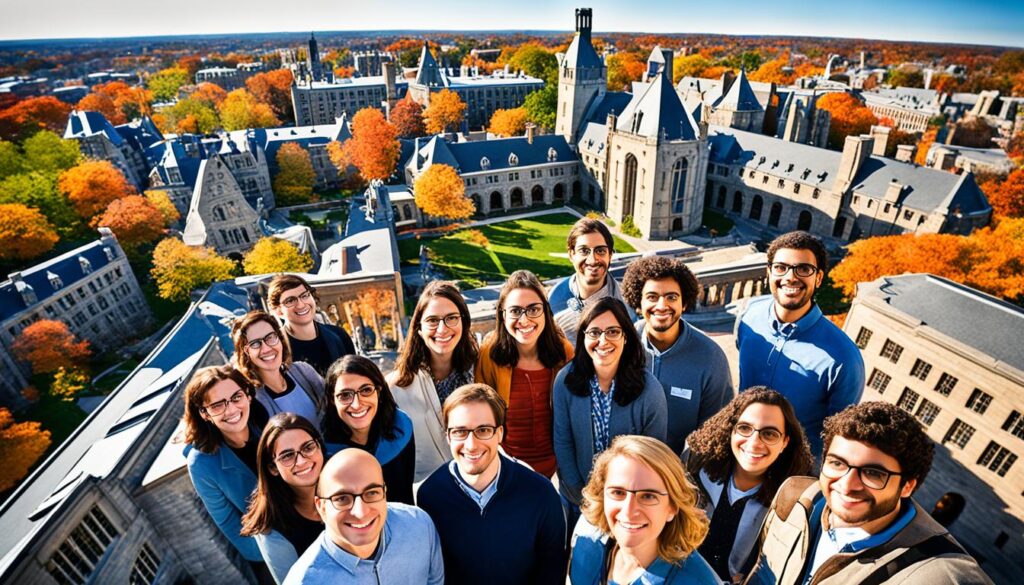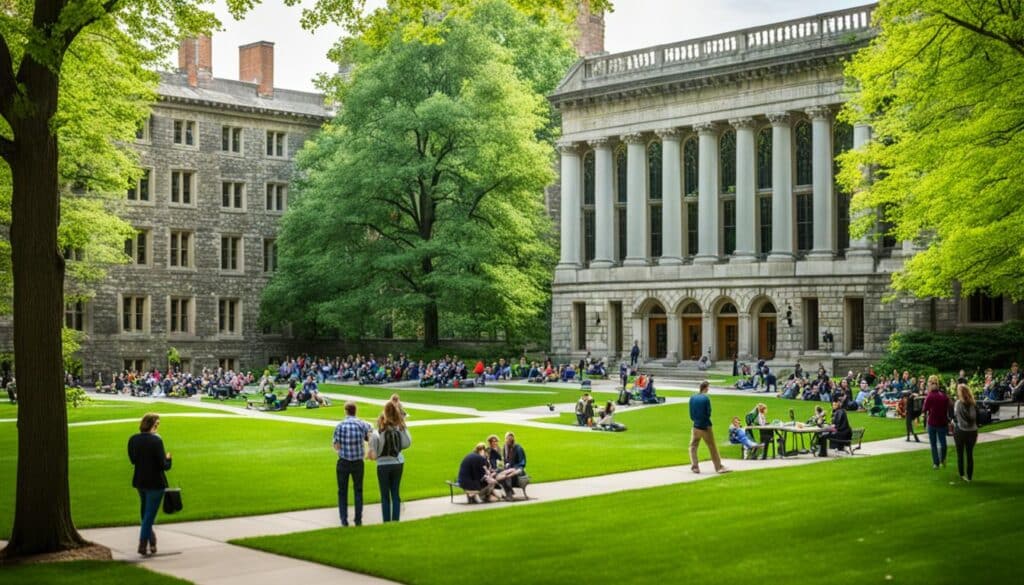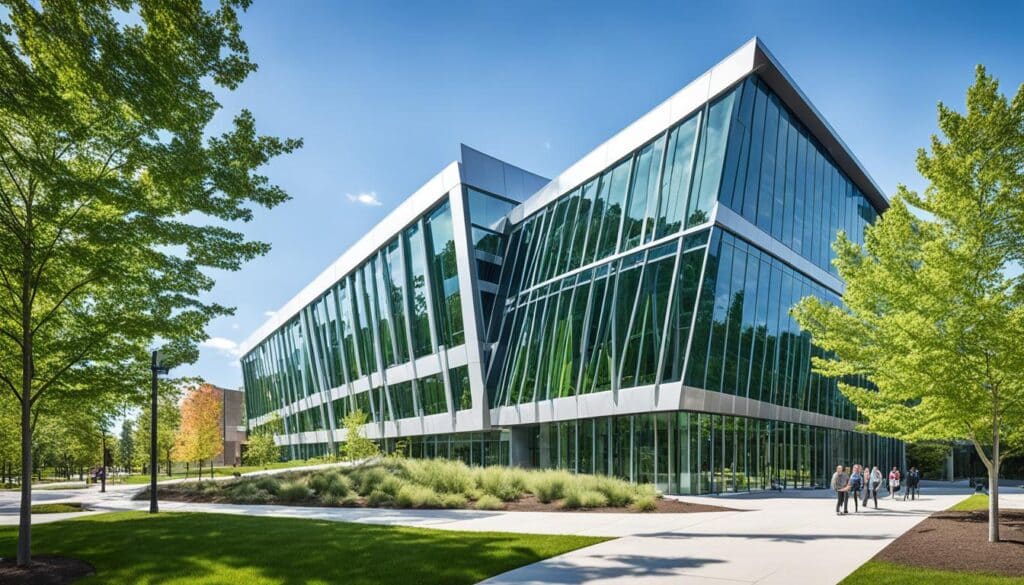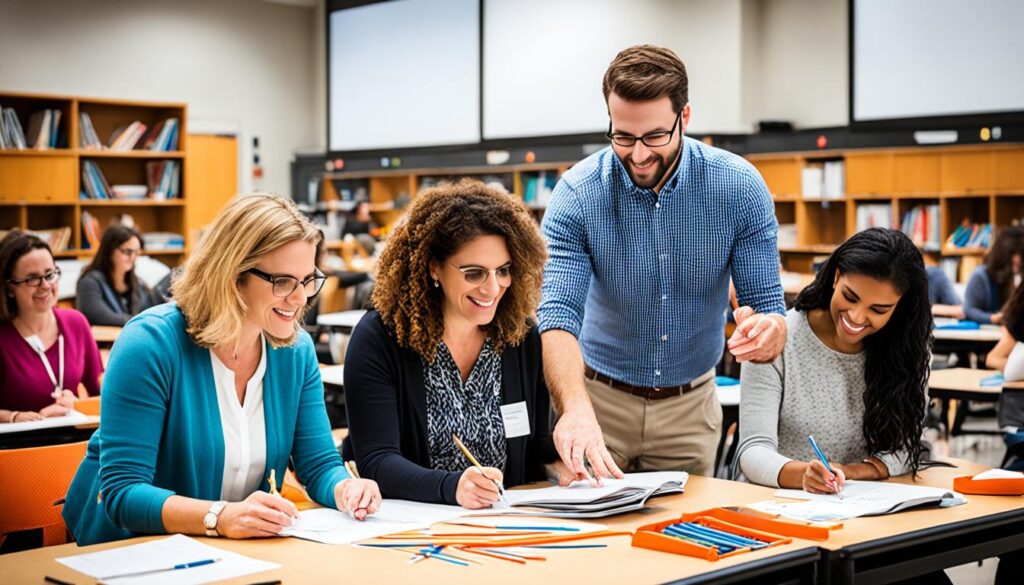Experience the pinnacle of academic excellence at Princeton University. As one of the prestigious Ivy League institutions, Princeton offers students an unparalleled education on its historic and picturesque campus. With world-class resources and a commitment to nurturing intellectual curiosity, students embark on an unrivaled academic journey that prepares them for success in their chosen fields.
Key Takeaways:
- Princeton University offers a top-notch Ivy League education with a focus on academic excellence.
- The historic campus provides a picturesque backdrop for learning.
- Students have access to world-class resources and faculty members who are leaders in their fields.
- Princeton’s rigorous and intellectually stimulating environment fosters a love for learning and encourages interdisciplinary exploration.
- Graduates of Princeton go on to successful careers in academia, government, and various industries.
Undergraduate Education at Princeton
Princeton University is committed to providing a transformative undergraduate education. With a focus on world-class teaching and a low student-to-faculty ratio, Princeton offers students an exceptional learning environment. The university’s esteemed professors are experts in their fields and foster close working relationships with their students.
At Princeton, the curriculum is designed to promote learning, creativity, innovation, and collaboration. Students have the opportunity to explore a wide range of disciplines while also developing a deep understanding in one area of concentration. This interdisciplinary approach prepares students for success in a rapidly changing world.
The Office of the Dean of the College oversees the undergraduate academic experience at Princeton. Under the guidance of the Dean, students receive the necessary support and guidance to thrive academically. Whether it’s choosing the right courses, pursuing research opportunities, or seeking mentorship, the Office of the Dean ensures that students have access to the resources they need.
“Princeton University offers an unparalleled undergraduate education. The combination of world-class teaching, low student-to-faculty ratio, and close working relationships with professors creates an environment where students can truly excel.”
The Princeton Difference
What sets undergraduate education at Princeton University apart is the emphasis on personalized learning and close mentorship. With a low student-to-faculty ratio, students have the opportunity to engage in meaningful discussions and receive individualized attention from professors. This fosters a culture of intellectual curiosity and a deeper understanding of the subject matter.
Princeton’s undergraduate education goes beyond the traditional classroom experience. Students have access to a wide range of resources, including research facilities, libraries, and state-of-the-art laboratories. These resources enable students to engage in hands-on learning and pursue independent research projects.
Princeton University Undergraduate Education Highlights
| Key Features | Description |
|---|---|
| World-Class Teaching | Princeton’s professors are leaders in their fields, providing students with a top-notch education. |
| Low Student-to-Faculty Ratio | With a low student-to-faculty ratio, students have ample opportunities for personalized interactions with professors. |
| Close Working Relationships | Students develop close working relationships with professors, fostering mentorship and guidance. |
| Interdisciplinary Approach | The curriculum at Princeton encourages students to explore a wide range of disciplines and develop a deep understanding of their chosen area of concentration. |
Whether students are pursuing a degree in the humanities, sciences, engineering, or any other field, Princeton University provides a world-class undergraduate education that prepares students for success in their chosen paths.
Graduate Student Experience at Princeton

Princeton University offers a vibrant graduate student experience. As a graduate student, you become part of a community of scholars at one of the world’s leading research universities. Working closely with a distinguished faculty, you have the opportunity to engage in original and independent scholarship across a wide range of disciplines.
At Princeton, we prioritize doctoral education while also offering select master’s degree programs. This focus on advanced research and scholarship ensures that our graduate students receive a rigorous and intellectually stimulating education that prepares them for successful careers.
Being part of the Princeton graduate student community means joining a network of driven individuals who are passionate about their areas of study. The collaborative atmosphere fosters meaningful connections and interdisciplinary collaborations, encouraging the exchange of ideas and pushing the boundaries of knowledge.
Financial support is an important aspect of the graduate student experience at Princeton. We offer a range of funding opportunities, including fellowships, assistantships, and grants, to support students in their academic pursuits.
Upon completing their degrees, Princeton graduates go on to make significant contributions in academia, government, and various sectors including non-profit and corporate organizations. A Princeton education equips you with the knowledge, skills, and network to excel in your chosen field.
The Community of Scholars
Princeton University is known for its vibrant community of scholars. As a graduate student, you have the opportunity to engage with fellow researchers and scholars who share your passion for learning and discovery. The campus serves as a hub for intellectual conversations and interdisciplinary collaborations, offering a rich environment for personal and academic growth.
Supportive Faculty and Leading Research
Princeton’s distinguished faculty is comprised of leading experts in their respective fields, who are committed to mentoring and guiding graduate students. They provide invaluable support and expertise as students pursue their research interests. This close interaction with faculty members ensures a personalized and impactful learning experience.
As a leading research university, Princeton offers a wealth of resources for graduate students to engage in cutting-edge research. From state-of-the-art laboratories and libraries to access to global networks, our students have the tools they need to contribute to the advancement of knowledge in their chosen fields.
The Doctoral Education Experience
Princeton’s focus on doctoral education allows graduate students to delve deeply into their fields of study and develop expertise through independent research. Our doctoral programs provide a solid foundation for original scholarship and critical thinking. During your time at Princeton, you will work alongside faculty mentors to conduct research that pushes the boundaries of knowledge and makes a meaningful impact.
Princeton University values the contributions of graduate students and recognizes their role as the next generation of scholars and leaders. We are committed to providing a supportive and intellectually stimulating environment that nurtures their growth and fosters excellence in research and scholarship.
Join us at Princeton University and embark on an enriching academic journey that will shape your future and open doors to endless possibilities.
Developing Research and Writing Skills at Princeton

Princeton University is renowned for its commitment to academic excellence, and an integral aspect of this commitment is the development of students’ research and writing skills. Through a combination of rigorous coursework, hands-on experiences, and dedicated support, Princeton equips its students with the tools and abilities necessary for success in independent research and scholarly writing.
At Princeton, independent research is not just encouraged—it is celebrated. Students have the opportunity to engage in original and intellectually stimulating research throughout their academic journey. This emphasis on independent research sets Princeton apart and allows students to make significant contributions to their respective fields. For many students, this culminates in the completion of a senior thesis or dissertation, which serves as a testament to their research and writing prowess.
Princeton University offers various avenues for students to enhance their research and writing abilities. Freshman seminars provide an early opportunity for students to work closely with professors on topics of special interest, fostering a passion for research from the very beginning. These small-group seminars allow for meaningful interactions and the development of foundational research skills.
The university also offers dedicated writing seminars, where students can refine their writing skills under the guidance of experienced and renowned faculty members. These seminars focus on the art of scholarly writing, helping students craft clear, concise, and persuasive academic papers. Through individual feedback and class discussions, students learn to express their ideas effectively and engage in critical analysis.
Undergraduate research opportunities abound at Princeton, allowing students to delve deep into their areas of interest. These research experiences not only provide valuable insights into the subject matter but also foster intellectual growth and curiosity. Students work alongside leading researchers and faculty members, gaining hands-on experience in designing experiments, collecting data, and drawing meaningful conclusions.
The Office of Undergraduate Research plays a crucial role in supporting students’ research endeavors. The office provides resources, funding opportunities, and mentorship to help students navigate the research process successfully. From identifying research opportunities to presenting findings at conferences, the Office of Undergraduate Research is a valuable resource for students at every step of their research journey.
Recognizing the importance of effective writing in academia, Princeton offers comprehensive writing support through the Writing Center. The Writing Center provides one-on-one writing consultations, where students can receive personalized advice and feedback on their written work. Whether it’s refining a thesis statement, honing argumentative skills, or polishing grammar and style, the Writing Center guides students towards becoming more confident and proficient writers.
The McGraw Center for Teaching and Learning is another invaluable resource for students seeking to improve their academic skills. The center offers programs and workshops designed to enhance students’ research, writing, and study skills. From time management tips to strategies for effective note-taking, the McGraw Center equips students with the tools and knowledge necessary for academic success.
Research and Writing Skills Development at Princeton
Princeton University offers a comprehensive range of programs and resources to develop students’ research and writing skills:
| Program/Resource | Description |
|---|---|
| Freshman Seminars | Small-group seminars that foster research skills and intellectual curiosity. |
| Writing Seminars | Dedicated seminars focused on scholarly writing and critical analysis. |
| Undergraduate Research Opportunities | Research experiences that allow students to engage in original research projects. |
| Office of Undergraduate Research | Provides resources, funding, and mentorship for students pursuing research. |
| Writing Center | Offers one-on-one writing consultations to enhance students’ writing skills. |
| McGraw Center for Teaching and Learning | Provides programs and workshops to improve research, writing, and study skills. |
By investing in the development of research and writing skills, Princeton University prepares its students for success in academia and beyond. These essential skills not only contribute to intellectual growth but also open doors to future opportunities and career paths.
The Liberal Arts Education at Princeton

Princeton University stands out for its dedication to providing a comprehensive liberal arts education. At Princeton, students are encouraged to broaden their outlooks by exploring diverse disciplines, including the humanities, arts, natural sciences, engineering, and social sciences. This interdisciplinary approach allows students to develop a well-rounded understanding of the world and fosters creativity and critical thinking.
A unique feature of Princeton’s liberal arts education is the yearlong humanities sequence. Through this immersive experience, students delve into texts that span 2,500 years of civilization, deepening their appreciation for human culture, history, and thought. By studying the humanities, students gain valuable insights into the human condition and develop the ability to analyze complex ideas and express themselves effectively.
In addition to the humanities sequence, Princeton University offers an integrated science curriculum. This curriculum bridges the gap between different scientific disciplines, enabling students to explore the interconnectedness of knowledge and gain a holistic understanding of the natural world. By combining scientific theory with practical applications, Princeton prepares students for successful careers in science and fosters their ability to tackle complex scientific challenges.
| Key Features of the Liberal Arts Education at Princeton |
|---|
| Broadens outlooks through interdisciplinary study |
| Yearlong humanities sequence spanning 2,500 years |
| Integrated science curriculum to bridge disciplinary gaps |
Princeton’s liberal arts education equips students with the knowledge, skills, and perspectives needed to excel in various career paths and pursue their passions. The interdisciplinary approach fosters intellectual curiosity, flexibility, and adaptability, preparing students to navigate the complexities of a rapidly changing world.
By embracing the liberal arts education at Princeton University, students embark on a transformative academic journey that broadens their horizons, challenges their assumptions, and empowers them to make a positive impact on society.
The Value of an Interdisciplinary Approach
“The interdisciplinary approach at Princeton breaks down the barriers between different fields of study, enabling students to make valuable connections across disciplines and gain a deeper understanding of the world.” – Dr. Jane Simmons, Professor of Interdisciplinary Studies
Dr. Simmons highlights the benefits of the interdisciplinary approach at Princeton. By integrating knowledge from various disciplines, students can approach complex problems from multiple perspectives and develop innovative solutions. This broad-based education prepares students to effectively navigate the complexities of the modern world, where many challenges require interdisciplinary thinking and collaboration.
Princeton University’s commitment to providing a liberal arts education sets it apart as an institution that values intellectual exploration, critical thinking, and the pursuit of knowledge across diverse disciplines. Graduates of Princeton’s liberal arts programs emerge with a well-rounded education that enables them to excel in their chosen fields and make meaningful contributions to society.
Engineering Studies at Princeton

Princeton University’s engineering programs challenge students to not only solve problems but also understand the importance of the problems they are solving. The programs emphasize the fundamental principles of engineering and their connections to society. Students engage in hands-on learning and gain a deep understanding of how engineering can shape and impact the world around them. With a focus on problem-solving and interdisciplinary collaboration, the engineering studies at Princeton prepare students for successful careers in various industries.
Hands-On Learning and Problem-Solving
At Princeton University, engineering studies go beyond classroom lectures. Students have the opportunity to apply their knowledge in practical settings through hands-on learning experiences. From designing and building prototypes to conducting experiments and simulations, students develop essential problem-solving skills that are crucial in the field of engineering. By working on real-world challenges, students learn to think critically and develop innovative solutions to complex problems.
As part of their engineering studies, students also collaborate with faculty and industry professionals on research projects. This collaborative approach allows students to explore different perspectives and gain a deeper understanding of the societal impact of their work. By working on projects that have real-world applications, students develop a strong sense of purpose and an appreciation for the role engineers play in solving pressing global challenges.
Interdisciplinary Approach and Societal Connections
Princeton University’s engineering programs embrace an interdisciplinary approach, recognizing that many of today’s engineering challenges require expertise from multiple fields. By integrating knowledge from diverse disciplines such as mathematics, physics, computer science, and biology, students gain a comprehensive understanding of complex systems and are better equipped to address multifaceted engineering problems.
The engineering programs at Princeton also emphasize the societal connections of engineering. Students explore the ethical, social, and environmental impacts of their work, promoting a responsible and sustainable approach to engineering practice. By considering the broader societal implications, students develop a holistic perspective and become well-rounded engineers who are equipped to make a positive difference in the world.
Engineering Studies at Princeton: A Path to Success
Princeton University’s engineering studies provide students with a strong foundation in problem-solving, fundamental principles, and their connections to society. The programs foster hands-on learning, interdisciplinary collaboration, and a deep understanding of the societal impacts of engineering. Students graduate from Princeton well-prepared for successful careers in various industries, whether it’s advancing technology, addressing global challenges, or improving the quality of life through innovative solutions. With its focus on excellence and societal relevance, Princeton University’s engineering programs offer students a pathway to becoming the next generation of engineering leaders.
The Faculty at Princeton
The faculty at Princeton University is a distinguished group of scholars and researchers who excel in both teaching and research. With over 1,200 members, including professors, associate professors, assistant professors, lecturers, and visitors, the faculty contributes to the university’s academic excellence and reputation for innovation.
Princeton University prioritizes the hiring of exceptional faculty members who are at the forefront of their respective fields. Their expertise and commitment to cutting-edge research enrich the academic environment and provide students with unique learning opportunities.
Seventy-seven percent of the professorial faculty at Princeton is tenured, ensuring stability and continuity in teaching. This tenure system allows faculty members to pursue long-term research projects and establish themselves as leaders in their disciplines.
Many faculty members at Princeton have received prestigious awards and honors, including Nobel Prizes, reaffirming their contributions to groundbreaking research that shapes our understanding of the world. Their accomplishments and recognition inspire students and demonstrate the caliber of scholarship at Princeton University.
Faculty Involvement in Teaching and Research
At Princeton, teaching and research go hand in hand. Faculty members are dedicated educators who are passionate about sharing their knowledge and mentoring students. They create engaging and intellectually stimulating classroom experiences, challenging students to think critically and develop as independent thinkers.
Beyond the classroom, faculty members at Princeton are actively involved in research and scholarship, pushing the boundaries of knowledge in their fields. Their research not only contributes to their own academic disciplines but also informs their teaching, allowing them to bring the latest developments and insights into the classroom.
The Role of Faculty in Guiding Students’ Academic Journeys
The faculty at Princeton play a crucial role in guiding and inspiring students’ academic journeys. Through close interaction with professors, students receive personalized guidance and mentorship, fostering intellectual growth and development.
Faculty advisors assist students in navigating academic programs, choosing courses, and exploring research opportunities. They provide valuable insights and support as students shape their academic paths and pursue their interests and goals.
Princeton’s commitment to small class sizes ensures that students have the opportunity to engage directly with faculty members, fostering meaningful connections and fostering an environment of intellectual curiosity and collaboration.
Faculty-Facilitated Research Opportunities
Princeton University is known for its strong emphasis on undergraduate research, and faculty members play a pivotal role in supporting and guiding students in their research endeavors. They provide mentorship, resources, and expertise, enabling students to delve deeply into their fields of interest and contribute to the expansion of knowledge.
Through these research opportunities, students gain real-world experience, refine their critical-thinking skills, and cultivate a deeper understanding of their chosen disciplines. This hands-on engagement with faculty members adds a unique dimension to the academic experience at Princeton University.
Faculty Contributions to the Academic Community
Princeton’s faculty members actively contribute to the scholarly community through their research, publications, and collaborations with peers around the world. They engage in conferences, workshops, and seminars, sharing their expertise and contributing to the academic discourse.
Faculty members also serve as mentors and advisors to graduate students, guiding them through their advanced research and helping them develop the skills necessary for successful careers in academia and beyond.
Princeton University takes great pride in its faculty and their contributions to the university’s mission of academic excellence and discovery. Their expertise, dedication, and passion for teaching and research create an intellectually vibrant atmosphere that nurtures the next generation of leaders and innovators.
Undergraduate College and Programs of Study
Princeton University offers a diverse range of undergraduate programs to cater to the varied interests and career goals of its students. With a commitment to providing a comprehensive academic experience, Princeton’s undergraduate college prepares students for success in their chosen fields.
At Princeton, students have the option to pursue two bachelor’s degrees – the Bachelor of Arts (A.B.) and the Bachelor of Science in Engineering (B.S.E.). These degrees open up a world of possibilities and set students on the path to achieve their academic and professional aspirations.
The undergraduate college at Princeton is home to over 90 departments and interdepartmental programs, covering a wide range of disciplines. These departments provide students with the opportunity to explore their passions and immerse themselves in their areas of interest.
Within these departments, students can choose from a vast array of majors and minors that align with their academic goals. Whether they are interested in the humanities, sciences, social sciences, or engineering, Princeton has a program of study to suit their interests and ambitions.
In addition to traditional majors and minors, Princeton also offers interdisciplinary certificate programs. These programs allow students to delve deeper into specific areas of study that bridge multiple disciplines. By earning a certificate, students can enhance their academic profile and pursue interdisciplinary interests.
| Degree Options | Departments and Programs | Additional Offerings |
|---|---|---|
| Bachelor of Arts (A.B.) | 90+ | Majors, Minors, Interdisciplinary Certificate Programs |
| Bachelor of Science in Engineering (B.S.E.) | Engineering Department | Engineering Specializations |
With the flexibility and breadth of options available, Princeton University provides students with the opportunity to customize their education and pursue their passions. The undergraduate college at Princeton is dedicated to nurturing the intellectual growth and academic success of its students, equipping them with the skills and knowledge they need to excel in their chosen fields.
The Creative Arts at Princeton

Princeton University’s commitment to the creative arts is evident through the Lewis Center for the Arts. The center comprises programs in creative writing, dance, theater and music theater, and visual arts, providing students with opportunities to explore and excel in their artistic pursuits. Over a quarter of Princeton undergraduates are enrolled in arts courses, and the center hosts numerous public arts events each year. Additionally, Princeton offers artist fellowships that support emerging artists and provide them with resources and opportunities to further develop their craft.
The Lewis Center for the Arts at Princeton University is a hub of creativity and innovation. Through its diverse programs, students can engage in a wide range of artistic disciplines and discover their passions. The Center encourages students to explore and experiment, pushing the boundaries of traditional art forms and fostering interdisciplinary collaborations.
The creative writing program at Princeton offers workshops and seminars taught by acclaimed authors, allowing students to refine their writing skills and pursue their literary aspirations. Whether it’s poetry, fiction, or non-fiction, students have the opportunity to immerse themselves in the world of words and storytelling.
In the field of dance, Princeton provides a vibrant and dynamic environment for students to develop their technical skills and artistic expression. From classical ballet to contemporary dance, the dance program offers a diverse range of classes and performance opportunities that challenge and inspire students.
Theater and music theater at Princeton are thriving disciplines that bring together talented students and renowned faculty to create captivating productions. Students are exposed to various aspects of theater, including acting, directing, playwriting, and stage design, while music theater combines the art forms of acting, singing, and dancing to create compelling performances.
The visual arts program at Princeton fosters creativity and critical thinking through a variety of mediums, including painting, sculpture, photography, and digital media. Students have access to state-of-the-art facilities and receive guidance from faculty who are accomplished artists themselves.
Princeton Atelier is another unique program offered by the Lewis Center for the Arts. It brings together students and professional artists from various disciplines to collaborate on innovative projects. Through these collaborations, students gain firsthand experience in the creative process and develop a deeper understanding of their chosen art form.
The artist fellowships provided by Princeton University offer emerging artists the opportunity to further develop their craft and pursue their artistic goals. These fellowships provide financial support, mentorship, and resources, allowing artists to focus on their creative work and make meaningful contributions to the art world.
Princeton University’s commitment to the creative arts and the Lewis Center for the Arts creates a vibrant and enriching environment for students interested in pursuing artistic endeavors. Through its programs, resources, and fellowships, Princeton empowers students to explore, innovate, and excel in their creative pursuits.
Program in Teacher Preparation

Princeton University’s Program in Teacher Preparation is an accredited program that offers undergraduate and graduate students the opportunity to obtain a New Jersey teaching certification. With over 50 years of experience, this program provides comprehensive training for future educators, reflecting Princeton’s commitment to excellence in education and the preparation of future leaders in the field.
Through a combination of coursework, field experiences, and mentoring, students in the Program in Teacher Preparation gain the knowledge and skills necessary to thrive in the teaching profession. The program equips students with a solid foundation in educational theory and practice, as well as practical classroom experience. Under the guidance of experienced faculty and mentors, students develop a deep understanding of instructional strategies, assessment techniques, and classroom management.
Whether you’re an undergraduate or graduate student, the Program in Teacher Preparation at Princeton University provides the opportunity to pursue a career in education, making a positive impact on the lives of students. The program prepares students for a range of teaching roles, from early childhood to secondary education, and focuses on fostering critical thinking, creativity, and effective communication in the classroom.
Upon completion of the program and meeting the state requirements, students are eligible to apply for a New Jersey teaching certification, further enhancing their career prospects. The certification opens doors to teaching opportunities in public and private schools, as well as a variety of educational settings.
| Program Highlights | Benefits |
|---|---|
| Comprehensive Training: The Program in Teacher Preparation provides a comprehensive curriculum that covers all aspects of teaching, including pedagogy, content knowledge, assessment, and diversity in the classroom. | Professional Development: The program offers ongoing professional development opportunities, keeping educators updated on the latest research and best practices in education. |
| Field Experiences: Students engage in field experiences, working in real classrooms under the guidance of experienced teachers. These experiences provide valuable insights into the teaching profession and help students develop practical skills. | Mentoring: Each student in the program is assigned a mentor who provides guidance and support throughout their journey, helping them navigate the challenges of teaching. |
| Network: The Program in Teacher Preparation connects students with a network of alumni who have successfully transitioned into teaching careers. This network provides valuable resources, mentorship, and job opportunities. | Diverse Educational Settings: The New Jersey teaching certification obtained through the program allows graduates to teach in a wide range of educational settings, providing flexibility and opportunities for career advancement. |
By joining the Program in Teacher Preparation at Princeton University, you’ll be part of a community of dedicated educators who are passionate about transforming the lives of students through education. Whether you’re interested in teaching in elementary schools, secondary schools, or special education, this program equips you with the skills and knowledge to make a meaningful impact in the classroom.
Focus on Mental Health and Personal Growth

Princeton University recognizes the importance of mental health and personal growth in students’ overall well-being and academic success. The university encourages students to prioritize self-discovery and to take care of their mental health throughout their college journey. By getting to know themselves on a personal level, students are better equipped to navigate the demands of college life and achieve academic success.
At Princeton, the well-being of students is a top priority. The university provides a wide range of resources and support systems to help students maintain their mental well-being and foster personal growth. Counseling and Psychological Services (CPS) offers confidential counseling services, workshops, and support groups to address various mental health concerns. A highly skilled and compassionate team of professionals is available to provide guidance and assistance to students.
In addition to mental health support, Princeton recognizes the importance of balance in students’ lives. The university offers numerous programs and initiatives to help students find their passions and engage in activities outside of the classroom. Whether it’s joining student organizations, participating in community service, or pursuing hobbies and interests, students are encouraged to explore and develop themselves beyond their academic pursuits.
Princeton’s commitment to personal growth goes hand in hand with academic success. The university understands that a well-rounded education involves not only intellectual rigor but also personal development. Through a variety of programs and initiatives such as the residential college system, mentorship programs, and career services, students have the opportunity to discover their strengths, build resilience, and develop essential life skills that contribute to their overall well-being and future success.
By focusing on mental health and personal growth, Princeton University supports students in their journey towards becoming well-rounded individuals, prepared to navigate the challenges of the world beyond Princeton. Through self-reflection, self-care, and a commitment to balance, students are equipped to thrive academically, socially, and emotionally.
Princeton University is dedicated to fostering an environment where students can flourish and find their own paths to personal and academic success. With a focus on mental health, personal growth, and well-being, Princeton empowers students to navigate the complexities of college life while achieving their goals and aspirations.
Also Read : Explore Programs At Bay Path University
Conclusion
Princeton University offers students a holistic education that combines rigorous academic pursuits with personal and intellectual growth. From undergraduate to graduate programs, Princeton provides a supportive and intellectually stimulating environment for students to thrive. The university’s commitment to academic excellence, combined with its emphasis on research, teaching, and creative arts, cultivates a lifelong love for learning. Whether pursuing a degree in the humanities, sciences, engineering, or the arts, students at Princeton embark on an academic journey that shapes their future and prepares them for a lifetime of success.
At Princeton, education goes beyond the classroom. Students are encouraged to explore their passions, discover new interests, and engage in research that extends the boundaries of knowledge. Alongside their academic pursuits, students also have opportunities for personal and intellectual growth. The university provides a range of resources and support systems to foster well-being and balance, ensuring that students can thrive academically while also taking care of their mental health.
As students at Princeton University, individuals become part of a vibrant community dedicated to lifelong learning. The university’s commitment to intellectual curiosity and academic rigor extends far beyond graduation. The skills and knowledge acquired during the academic journey at Princeton prepare students for a lifetime of continued growth and success, whether in their chosen careers or as lifelong learners. Princeton University truly epitomizes the power of education to transform lives and empower individuals to make a positive impact on the world.
FAQs
Q: What is Princeton University known for?
A: Princeton University is known for its academic excellence, prestigious Ivy League status, beautiful campus, and notable alumni.
Q: How can I apply for admission to Princeton University?
A: To apply for admission to Princeton University, you need to submit a complete application through the Common Application or the Coalition Application, along with all required documents and materials.
Q: What are the university rankings of Princeton University?
A: Princeton University consistently ranks among the top universities globally, often being ranked within the top 5 of various world university rankings.
Q: Can you tell me about the campus life at Princeton University?
A: Campus life at Princeton University is vibrant and diverse, offering students a wide range of activities, clubs, and events to participate in.
Q: Who are some notable alumni of Princeton University?
A: Princeton University boasts a long list of notable alumni, including Woodrow Wilson, Michelle Obama, and Jeff Bezos.
Q: What is new at Princeton University for the academic year 2024?
A: For the academic year 2024, Princeton University is introducing innovative programs and initiatives to enhance the student experience and academic offerings.
Q: Where can I find the Princeton University Art Museum on campus?
A: The Princeton University Art Museum is located on campus, near Nassau Hall, and houses a vast collection of artworks spanning different eras and cultures.
Source Links
- https://www.princeton.edu/academics/studying-princeton
- https://profile.princeton.edu/academic-life
- https://admission.princeton.edu/blogs/value-self-discovery